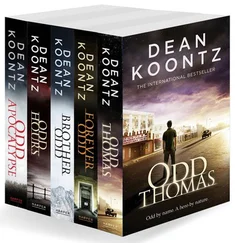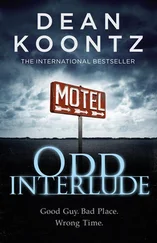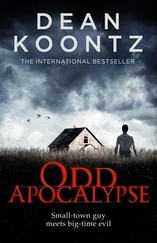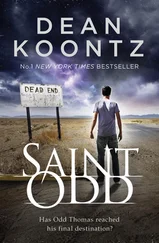Challenging Ozzie's assertion that a fictional detective could have any personal problems or habits, however unpleasant, and still be a hit with the public as long as the author had the skill to make the character sympathetic, the editor had said, "No one could make a large audience want to read about a detective who stuck a finger down her throat and threw up after every meal."
The first novel featuring such a detective won an Edgar Award, the mystery genre's equivalent of an Oscar. The tenth book in the series had been recently published to greater sales than any of the previous nine.
In solemn tones that fail to disguise his impish glee, Ozzie says that no novels in the history of literature have featured so much vomiting to the delight of so many readers.
Ozzie's success doesn't in the least surprise me. He likes people and he listens to them, and that love of humanity shines out of his pages.
When I finished telling him about Robertson, the black room, and the file cabinets packed with thick case histories of homicidal maniacs, he said, "Odd, I wish you would get a gun."
"Guns scare me," I reminded him.
"Your life scares me . I'm certain Wyatt Porter would issue you a permit to carry a concealed weapon."
"Then I'd have to wear a sports jacket."
"You could switch to Hawaiian shirts, carry the gun in a belt holster in the small of your back."
I frowned. "Hawaiian shirts are just not me."
"Oh, yes," he said with undisguised sarcasm, "your T-shirts and jeans are such a unique fashion statement."
"Sometimes I wear chinos."
"The depth of your wardrobe dazzles the mind. Ralph Lauren weeps."
I shrugged. "I am who I am."
"If I purchase a suitable weapon for you and personally instruct you in its use-"
"Thank you, sir, for your concern, but for sure I'd shoot off both my feet, and the next thing I knew, you'd be writing a series about a footless private investigator."
"It's already been done." He sipped his wine. "Everything's already been done. Only once in a generation does anything as fresh as a vomiting detective come along."
"There's still chronic diarrhea."
He grimaced. "I'm afraid you haven't the knack to be a popular mystery novelist. What have you been writing lately?"
"This and that."
"Assuming 'this' refers to grocery-shopping lists and 'that' refers to mash notes to Stormy Llewellyn, what else have you been writing?"
"Nothing," I admitted.
When I was sixteen, P. Oswald Boone, then a mere 350 pounds, agreed to judge a writing contest at our high school, from which he himself had graduated some years earlier. My English teacher required each of her students to submit an entry to the contest.
Because my Granny Sugars had only recently died and because I'd been missing her, I wrote a piece about her. Unfortunately, it won first prize, making of me a minor celebrity in high school, though I preferred to keep a low profile.
For my memories of Granny, I received three hundred dollars and a plaque. I spent the money on an inexpensive but quite listenable music system.
The plaque and the music system were later smashed to bits by an angry poltergeist.
The only long-term consequence of that writing contest had been my friendship with Little Ozzie, for which I was grateful, although for five years he had harassed me to write, write, write. He said that such a talent was a gift and that I had a moral obligation to use it.
"Two gifts are one too many," I told him now. "If I had to deal with the dead and also write something worthwhile, I'd either go stark raving mad or shoot myself in the head with that gun you want to give me."
Impatient with my excuses, he said, "Writing isn't a source of pain. It's psychic chemotherapy. It reduces your psychological tumors and relieves your pain."
I didn't doubt either that this was true for him or that he had enough pain to require a lifetime of psychic chemotherapy.
Although Big Ozzie was still alive, Little Ozzie saw his father only once or twice a year. On each occasion, he required two weeks to recover his emotional equilibrium and trademark good humor.
His mother was alive, too. Little Ozzie hadn't spoken to her in twenty years.
Big Ozzie currently weighed, at a guess, only fifty pounds less than his son. Consequently, most people assumed that Little Ozzie had inherited his obesity.
Little Ozzie, however, refused to portray himself as a victim of his genetics. He said that at the heart of him was a weakness of will that resulted in his immensity.
Over the years, he sometimes implied and I frequently inferred that his parents had broken a part of his heart that resulted in this mortal weakness of will. He never spoke of his difficult childhood, however, and refused to describe what he had endured. He just wrote mystery novel after mystery novel__
He didn't speak of his folks with bitterness. Instead, he spoke of them hardly at all and avoided them as best he could-and wrote book after book about art, music, food, and wine____________________
"Writing," I told him now, "cant relieve my pain as much as it's relieved by the sight of Stormy… or by the taste of coconut cherry chocolate chunk ice cream, for that matter."
"I have no Stormy in my life," he replied, "but I can understand the ice cream." He finished his wine. "What are you going to do about this Bob Robertson?"
I shrugged.
Ozzie pressed me: "You've got to do something if he knows that you were in his house this afternoon and already he's following you around."
"All I can do is be careful. And wait for Chief Porter to get something on him. Anyway, maybe he wasn't actually following me. Maybe he heard about your exploding cow and stopped by to gawk at the ruins."
"Odd, I would be indescribably disappointed if, having not yet employed your writing gift to any useful purpose, you wound up dead tomorrow."
"Just think how I'd feel."
"I might wish that you'd grow wiser faster, get a gun and write a book, but I won't wish anyone's life away for him. 'How swift are the feet of the days of the years of youth.' "
Giving attribution to the quote, I said, "Mark Twain."
"Excellent! Perhaps you aren't a willfully ignorant young fool, after all."
"You used that quote once before," I admitted. "That's how I know it."
"But at least you remembered! I believe this reveals in you a desire, even if unconscious, to give up the griddle and make yourself a man of literature."
"I expect I'll switch to tires first."
He sighed. "You're a tribulation sometimes." He rang his empty wineglass with one fingernail. "I should've brought the bottle."
"Sit still. I'll get it," I said, for I could fetch the Cabernet from the kitchen in the time that he would require merely to lever himself up from his armchair.
The ten-foot-wide hallway served as a gallery for fine art, and opening off both sides of it were rooms rich with still more art and books.
At the end of the hall lay the kitchen. On a black-granite counter stood the bottle, uncorked to let the wine breathe.
Although the front rooms had been comfortably air-conditioned, the kitchen proved to be surprisingly warm. Entering, I thought for an instant that all four ovens must be filled with baking treats.
Then I saw that the back door stood open. The desert evening, still broiling in the stubborn summer sun, had sucked the coolness from the kitchen.
When I stepped to the door to close it, I saw Bob Robertson in the backyard, as pale and fungoid as ever he had looked.
ROBERTSON STOOD FACING THE HOUSE, AS THOUGH waiting for me to see him. Then he turned and walked toward the back of the property.
For too long, I hesitated in the doorway, uncertain what I should do.
Читать дальше
Конец ознакомительного отрывка
Купить книгу
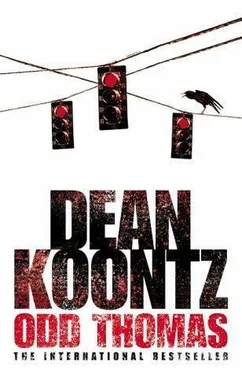
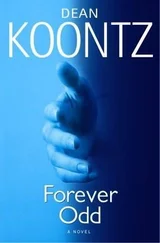
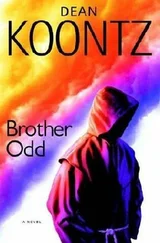
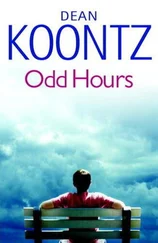



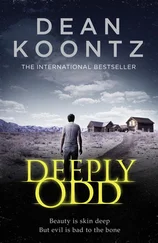
![Dean Koontz - You Are Destined To Be Together Forever [an Odd Thomas short story]](/books/705298/dean-koontz-you-are-destined-to-be-together-foreve-thumb.webp)
